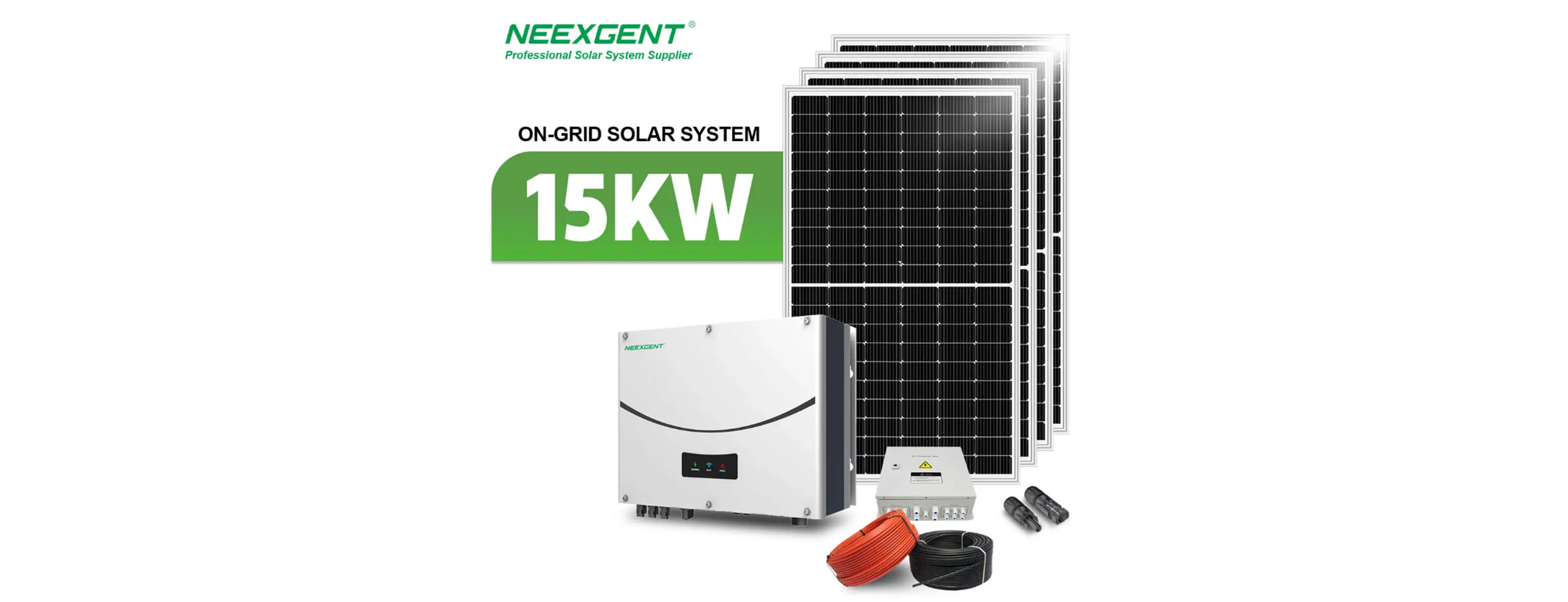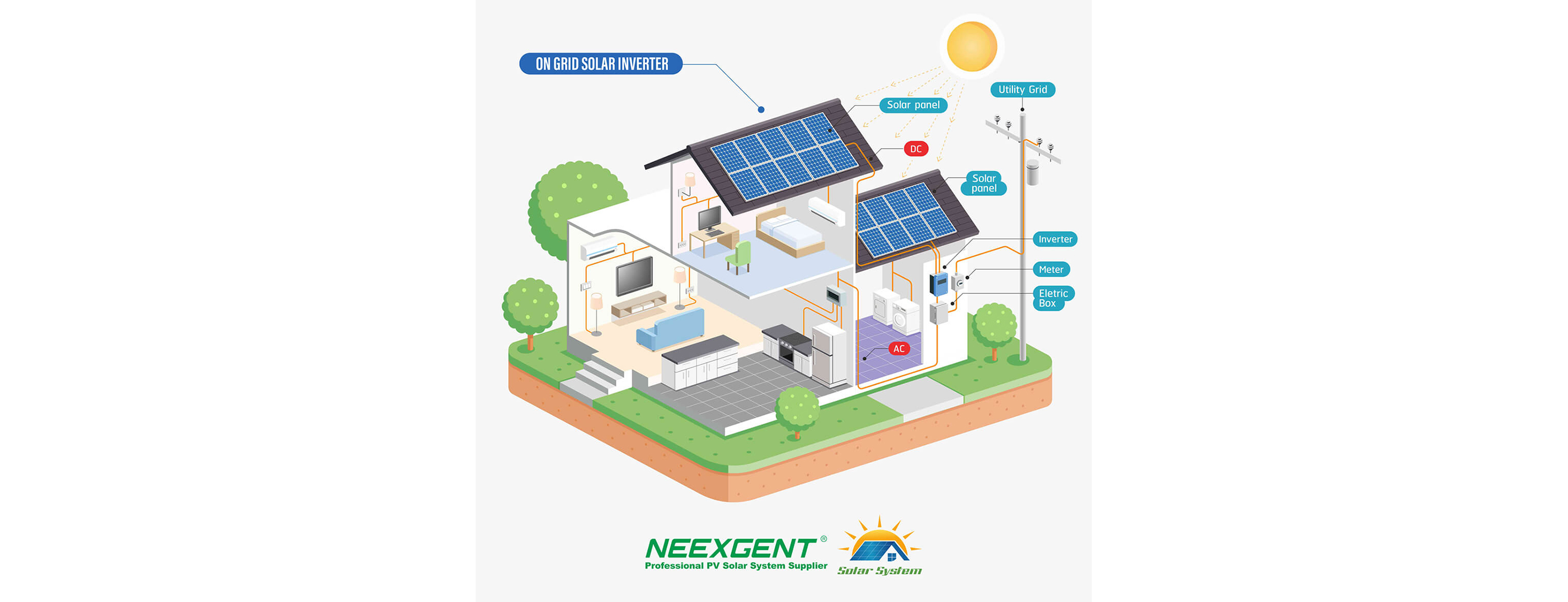On-grid solar systems, also known as grid-tied solar systems, are a popular and cost-effective option for homeowners looking to reduce their energy bills and carbon footprint. In this comprehensive guide, we'll cover everything you need to know about on-grid solar systems, including their components, advantages, and considerations for installation.

15KW ON-GRID SOLAR SYSTEM
What is an On-Grid Solar System?
An on-grid solar system is a solar power system that is connected to the main power grid. It generates electricity from the sun and feeds it into the grid for use by households and businesses. When the solar panels produce more electricity than the household needs, the excess electricity is sent back into the grid, and homeowners receive credits or compensation for it.
Components of an On-Grid Solar System
The main components of an on-grid solar system include solar panels, an inverter, and a monitoring system. Solar panels capture sunlight and convert it into direct current (DC) electricity. The inverter converts the DC electricity into alternating current (AC) electricity, which is used to power household appliances. The monitoring system tracks the energy produced by the solar panels and provides information on energy usage.
Advantages of On-Grid Solar Systems
On-grid solar systems offer several advantages to homeowners, including cost savings, reliability, and sustainability. By generating their own electricity, homeowners can reduce their reliance on grid-tied electricity, which can be expensive and subject to price fluctuations. Additionally, on-grid solar systems offer a reliable source of energy, especially during power outages or emergencies. Finally, on-grid solar systems are a sustainable and eco-friendly energy solution, reducing greenhouse gas emissions and contributing to a greener future.
Considerations for Installing an On-Grid Solar System
Before installing an on-grid solar system, there are several considerations to keep in mind. Firstly, homeowners should assess their energy needs and the size of their property to determine the size of the solar system they require. Additionally, homeowners should consider the orientation and shading of their property to ensure that the solar panels receive maximum sunlight. Finally, homeowners should ensure that their property meets any local regulations or permits required for the installation of solar systems.
Maintenance and Monitoring of On-Grid Solar Systems
On-grid solar systems require minimal maintenance, but regular monitoring can help ensure they continue to operate efficiently. Homeowners should regularly clean their solar panels to remove dirt and debris and ensure maximum energy production. Additionally, monitoring energy usage and production can help homeowners identify any issues with their system and address them promptly.

On-Grid Solar System Incentives and Rebates
Several incentives and rebates are available to homeowners who install on-grid solar systems. These include federal tax credits, state-level incentives, and utility rebates. These incentives can significantly reduce the upfront cost of installing an on-grid solar system, making it a more cost-effective option for homeowners.
It's important for homeowners to work with a reputable and experienced solar installer to ensure their on-grid solar system is installed correctly and safely. A professional installer can also help homeowners navigate any regulations or permits required for the installation process.
One consideration for homeowners to keep in mind is that on-grid solar systems are dependent on the availability of grid-tied electricity. During a power outage, the system will automatically shut down to prevent energy from being fed back into the grid, which can be a safety hazard for utility workers repairing power lines. However, homeowners can install battery storage systems to store excess energy produced by their solar panels for use during power outages.
On-grid solar systems is that homeowners can potentially earn money by selling their excess energy back to the grid. This is made possible through net metering programs, which allow homeowners to receive credits on their utility bills for the excess energy they produce.
On-grid solar systems are a smart and cost-effective energy solution for homeowners looking to reduce their reliance on grid-tied electricity and contribute to a more sustainable future. By understanding the components, advantages, and considerations for installation, homeowners can make informed decisions about whether an on-grid solar system is the right choice for them. With proper maintenance and monitoring, on-grid solar systems can provide reliable and sustainable energy for years to come.
It's important to note that on-grid solar systems are not the best option for all homeowners. For those who live in areas with frequent power outages or who desire energy independence, off-grid or hybrid solar systems may be a better fit. Off-grid solar systems operate independently of the main power grid and rely on battery storage to store excess energy produced by the solar panels. Hybrid solar systems combine the benefits of on-grid and off-grid systems, allowing homeowners to store excess energy while remaining connected to the grid for backup power.
Homeowners should also consider the environmental impact of their on-grid solar system. While solar energy is a clean and renewable energy source, the production of solar panels does have an environmental impact. It's important for homeowners to research and choose solar panels and components that are produced sustainably and ethically.
On-grid solar systems are a cost-effective and sustainable energy solution for homeowners. By understanding the components, advantages, and considerations for installation, homeowners can make informed decisions about whether an on-grid solar system is the right choice for them. With proper maintenance and monitoring, on-grid solar systems can provide reliable and sustainable energy for years to come, reducing energy bills and carbon footprints in the process.
It's also worth noting that on-grid solar systems can increase the value of a home. According to a report by the National Renewable Energy Laboratory, homes with solar panels typically sell for higher prices than those without. This is because potential buyers recognize the long-term savings and environmental benefits of solar energy. In addition, homes with solar panels often sell faster than those without, as they are seen as more desirable in today's environmentally-conscious market.
It's important for homeowners to keep in mind that the cost of an on-grid solar system can vary depending on factors such as the size of the system, the number of solar panels, and the complexity of the installation. However, with the availability of various financing options such as solar loans, power purchase agreements, and solar leases, it's easier than ever for homeowners to finance the installation of an on-grid solar system.
On-grid solar systems are a smart investment for homeowners looking to reduce their energy bills and contribute to a more sustainable future. By understanding the components, advantages, and considerations for installation, homeowners can make informed decisions about whether an on-grid solar system is the right choice for them. With proper maintenance and monitoring, on-grid solar systems can provide reliable and sustainable energy for years to come, increasing home value and reducing carbon footprints in the process.
As more and more homeowners turn to on-grid solar systems as a reliable and sustainable energy solution, it's clear that solar power is here to stay. With advancements in solar panel technology, battery storage, and financing options, on-grid solar systems are becoming increasingly affordable and accessible for homeowners.
The benefits for individual homeowners, on-grid solar systems also play a crucial role in reducing carbon emissions and combatting climate change. According to the International Energy Agency, solar power is the cheapest source of electricity in history, and has the potential to become the world's largest source of electricity by 2050. By investing in on-grid solar systems, homeowners are not only making a smart financial decision, but also contributing to a more sustainable and environmentally-friendly future for all.
On-grid solar systems are a cost-effective, reliable, and sustainable energy solution for homeowners. By understanding the components, advantages, and considerations for installation, homeowners can make informed decisions about whether an on-grid solar system is the right choice for them. With proper maintenance and monitoring, on-grid solar systems can provide reliable and sustainable energy for years to come, reducing energy bills, increasing home value, and contributing to a more sustainable future.







